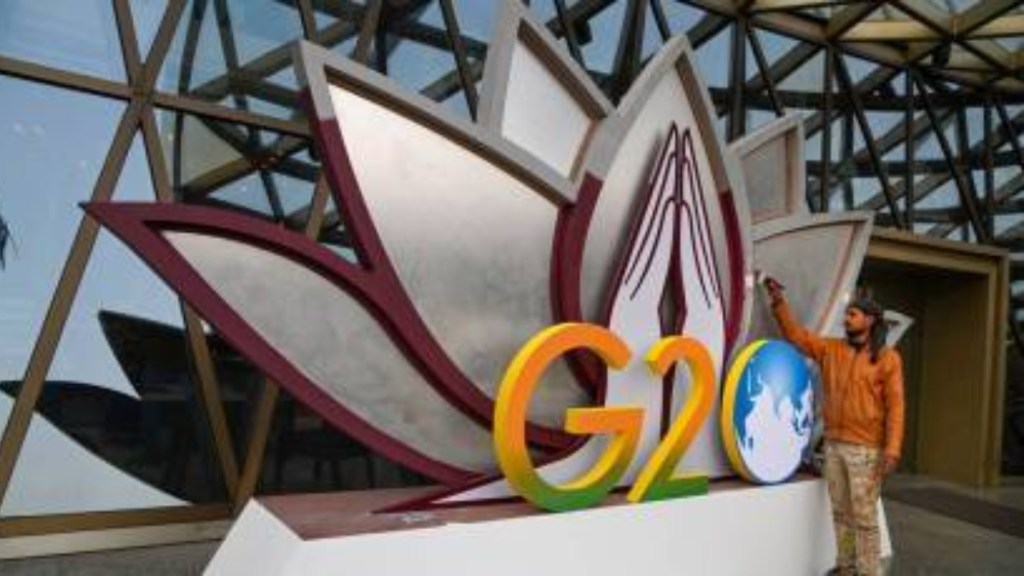Himanshu Rai
The G20 serves as a platform for member countries to cooperate on economic, financial, and development issues and to find collective solutions to global challenges. From December 2022 to November 2023, the G20 presidency will be held by India. The main event will be held on September 9-10, 2023, and India will be hosting around 200 meetings with participants from 32 sectors.
The motto of this year’s summit is “One Earth, One Family, One Future,” derived from the ancient Indian concept of ‘vasudhaiva kutumbakam’, (treating the world as one family), highlighting the deep-rooted Indian value of inclusion and focussing on the reinforcement of multilateralism and cooperation among the countries in an increasingly polarised world.
With the world witnessing economic slowdown and the geopolitical turmoil caused by the Russia-Ukraine War, India has emerged as a significant player with its assertive stance for strategic autonomy.
The statement made by the Indian prime minister, Narendra Modi, at the 2022 G20 Summit in Bali, “This era is not of war,” resonated with other members while also conveying India’s commitment to world peace and multilateralism. India can use the presidency to advance its own geopolitical interests by focusing on strategic issues and working to build consensus among other G20 members.
Thus, the presidency for 2023 has provided the country with some valuable opportunities.
Often overlooked by the global powers, many regions, especially the African nations, have limited representation in global fora. India is committed to proposing an upgrade of the African Union from a permanent observer to a full-fledged member. The presidency is supported by a ‘troika’—consisting of the previous, current, and incoming presidencies (Indonesia, India, and Brazil). This provides a greater representation of the priorities of the Global South.
A 2011 report by the Asian Development Bank forecast that large economies like China and India would now have a pivotal role in global economic governance. India can include the success stories of Asian regions during the discussions for global policy frameworks. It will reiterate the crucial role of the region by providing insights for improving the resilience of the world economy.
As the G20 president, India must deepen its alliances with the IMF, OECD, WHO, World Bank, and WTO, and push for tougher controls on terror-related finances. In an attempt to build strategic ties and provide equitable opportunities, India has invited non-member partner countries—Bangladesh, Mauritius, the Netherlands, Nigeria, Oman, Singapore, and Spain to join the summit.
From December 7-4, 2022, the First Sherpa Meeting for the G20 2023 was held in Udaipur, Rajasthan. The Sherpas experienced the culture and heritage of the region and witnessed the working of UPI (Unified Payments Interface), demonstrating how convenient the ingenious technology is. Thus, it is an opportunity for India to bring to the world’s media, its expertise and accomplishments, especially in the fields of fintech and green energy. This will enable the nation to collaborate with other countries in scaling Indian innovations, to promote the Indian tourism sector, and usher in infrastructure development.
Detailed policy recommendations, coverage, and discussions on the key global issues and India’s take on them could be made a part of the agenda of the summit, with important issues such as curbing terrorism funding and financing, climate financing (to ensure resilient supply chains), clean energy projects, sustainable development, and promoting MSMEs. Some important actionables could be:
n Sharing insights from Indian policy reforms like the National Logistics Policy, the creation of the Open Network for Digital Commerce (ONDC), and proposal for developing food corridors (especially between India and West Asia), like the millet corridor, etc, thus creating opportunities for collaboration with other countries.
n The Startup 20 Engagement Group is a new addition to the G20 engagement groups proposed under India’s presidency. This could be a new step towards international economic and policy cooperation on specific interests of the startup sector.
n The G20 presidency presents India with a chance to emerge as a crusader of regulatory reforms by contributing towards a global regulatory framework and the setting-up of an institutional body for Regulatory Development.
n India needs to leverage its presidency to lead discussions detailing the insights from and scope of Indian global efforts like the Green Grids initiative—One Sun, One World, One Grid initiative (creating a global solar energy grid) and proposing initiatives and policy incentives on the use of clean energy and other goals.
n The G20 must provide political support and commitment to active dialogue on how to reduce trade turbulence during crises and suggest regulations that maintain stability in times of critical necessity. The current situations also make it imperative to strengthen supply chain preparedness and resilience, and India can spearhead the efforts.
Thus, the G20 presidency can aid India can become the voice of the Global South and create a lasting impact by bringing global leaders together to tackle relevant challenges and enhancing the international forum.
(Director, IIM Indore)
